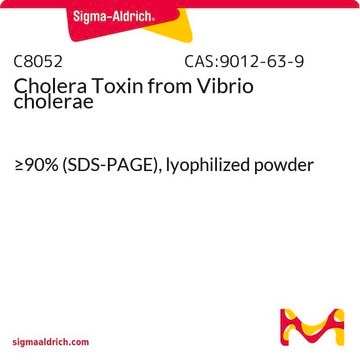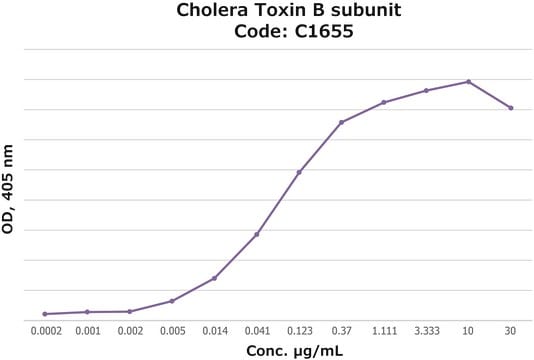G9652
Monosialoganglioside GM1 from bovine brain
lyophilized powder, BioXtra, γ-irradiated, ≥95% (TLC)
Synonym(s):
Ganglioside GM1, monosialo
About This Item
Recommended Products
Quality Level
sterility
γ-irradiated
product line
BioXtra
Assay
≥95% (TLC)
form
lyophilized powder
mol wt
~1540
technique(s)
blocking: suitable
impurities
endotoxin, tested
solubility
chloroform/methanol: 9.80-10.20 mg/mL, clear to slightly hazy, colorless to light yellow
storage temp.
−20°C
SMILES string
CCCCCCCCCCCCCCCCCCCC(=O)N[C@H](CO[C@@H]1O[C@H](CO)[C@@H](O[C@@H]2O[C@H](CO)[C@H](O[C@@H]3O[C@H](CO)[C@H](O)[C@H](O[C@@H]4O[C@H](CO)[C@H](O)[C@H](O)[C@H]4O)[C@H]3NC(C)=O)[C@H](O[C@@]5(C[C@H](O)[C@@H](NC(C)=O)[C@@H](O5)[C@H](O)[C@H](O)CO)C(O)=O)[C@H]2O)[C@H](O)[C@H]1O)[C@@H](O)\C=C\CCCCCCCCCCCCCCC
InChI
1S/C73H131N3O31/c1-5-7-9-11-13-15-17-19-20-22-24-26-28-30-32-34-52(86)76-44(45(83)33-31-29-27-25-23-21-18-16-14-12-10-8-6-2)40-99-69-61(93)59(91)63(50(38-79)102-69)104-71-62(94)67(98-41-47(85)55(87)66-53(74-42(3)81)46(84)35-73(97,107-66)72(95)96)64(51(39-80)103-71)105-68-54(75-43(4)82)65(57(89)49(37-78)100-68)106-70-60(92)58(90)56(88)48(36-77)101-70/h31,33,44-51,53-71,77-80,83-85,87-94,97H,5-30,32,34-41H2,1-4H3,(H,74,81)(H,75,82)(H,76,86)(H,95,96)/b33-31+/t44?,45?,46-,47?,48+,49+,50+,51+,53+,54+,55?,56-,57-,58-,59+,60+,61+,62+,63+,64-,65+,66+,67+,68-,69+,70-,71-,73-/m0/s1
InChI key
CNLVNZJJSHZYAS-ALSOZVJRSA-N
Looking for similar products? Visit Product Comparison Guide
Amino Acid Sequence
General description
Application
Biochem/physiol Actions
Monosialoganglioside GM1 was one of many mono- and oligosaccharide ligands studied for their affinity for NKR-P1, a membrane protein on natural killer cells, which contains an extracellular Ca2+-dependent lectin domain. Monosialoganglioside GM1 is effective in partially correcting the consequences of neuroinjury in a number of in vivo and in vitro model systems.
Preparation Note
Storage Class Code
11 - Combustible Solids
WGK
WGK 3
Flash Point(F)
Not applicable
Flash Point(C)
Not applicable
Personal Protective Equipment
Certificates of Analysis (COA)
Search for Certificates of Analysis (COA) by entering the products Lot/Batch Number. Lot and Batch Numbers can be found on a product’s label following the words ‘Lot’ or ‘Batch’.
Already Own This Product?
Find documentation for the products that you have recently purchased in the Document Library.
Customers Also Viewed
Our team of scientists has experience in all areas of research including Life Science, Material Science, Chemical Synthesis, Chromatography, Analytical and many others.
Contact Technical Service















